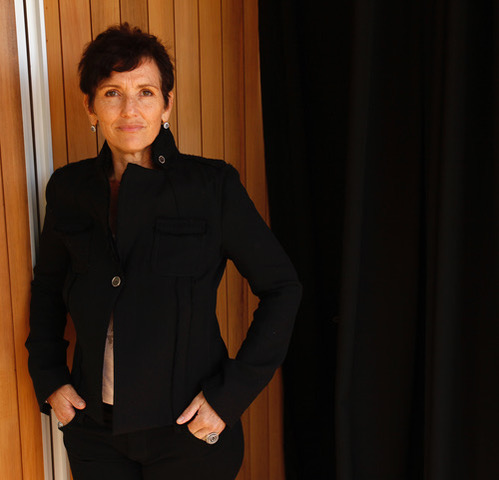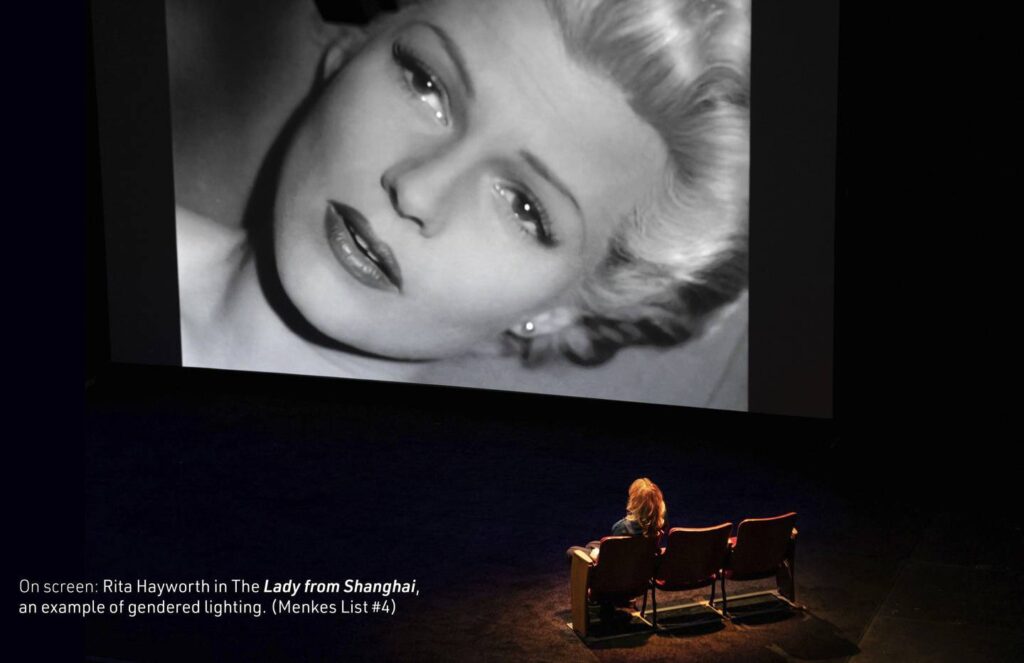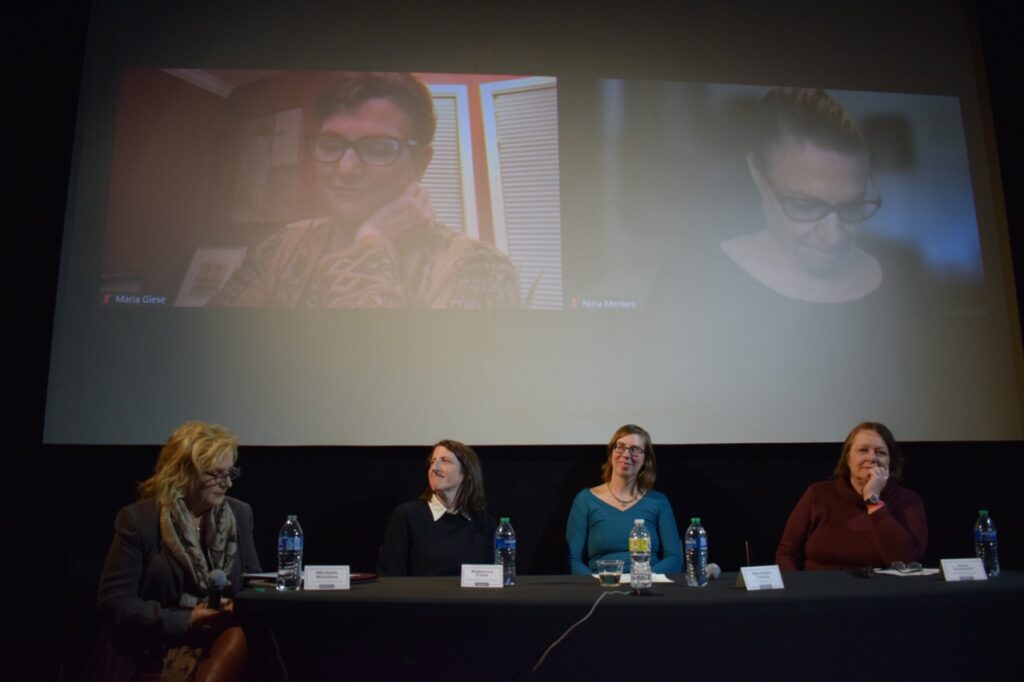
By Judy Carmack Bross
Maria Giese said she often felt like a kamikaze, but her victorious drive for parity for women film directors in Hollywood was instrumental in launching the #MeToo Movement as well. A panel member at the FACETS Chicago premiere of “BRAINWASHED: Sex-Camera-Power,” the powerful new Nina Menkes documentary she co-produced, Giese talked with us about how in 2013 she brought a legal argument and statistics to the ACLU and the EEOC and won.

SANTA MONICA, CA – MAY 12, 2015 — Director Maria Giese was instrumental in getting the attention of the ACLU who have recently sent letters to state and federal agencies regarding requesting an investigation into gender discrimination in Hollywood. Giese was photographed in Santa Monica on May 12, 2015. (Genaro Molina/Los Angeles Times)
After five years at UCLA graduate film school, Giese was elated when Frances Ford Coppola handed her an MFA and she got greenlit on a $2 million feature film in the UK in 1994. Fifteen years later, however, she was out of work and at her limit of frustration– none of her very capable women classmates were getting any directing jobs either. As she says, “Back then, there was no clear system for researching this inequity, but by 2012 we had the internet. I could count the number of female director hires and compare them with those of men.”
Giese was staggered to see that women director employment numbers had been sinking since the year she graduated and that they were criminally low. As she says, “the lowest of any industry in the US, including coal mining.” She began lobbying her union, the Directors Guild of America which she calls “a vastly a male-dominated ‘club’. I got no help from them.”
Giese reasoned that if approximately 80% of the entertainment media that gets distributed around the world comes from Hollywood and almost 100% of those films are directed by men, then that is “tantamount to the censoring and silencing of women’s voices and perspectives everywhere.” She says she understood that, based on Title VII (equal employment opportunity law) and the damning statistics, she had a case for the Supreme Court. Taking it on, however, would likely lead her to permanent career failure. Giese explains, “Speaking out using your name in Hollywood means getting blacklisted, and if you can’t speak out using Title VII without getting shut out, that means this law is not functional.” Even so, she says she knew that unless she changed everything for all women directors, she would never work again herself. As she put it, “I had to do it. And I had to use my name.”
Giese started a blog and wrote articles analyzing the complex, systemic problems facing women in her profession, as well as diversity programs in her union and at studios and networks that failed them. The explosion of the internet and social media suddenly made communicating these issues easier. Using a blog, Giese wrote articles that could then be disseminated on social media. As she says, “In 2013 and 2014, I was able to get my articles out to hundreds of thousands of people”. Very quickly mainstream news media took notice, including The New York Times. Manohla Dargis picked up the story, calling Giese’s work in the Directors Guild “a veritable crusade”. Giese soon made the words “Woman Director” a household term.
Giese first took her statistics and legal brief to the EEOC but was turned away. “I knew I needed a bigger bully than my Guild, so in the spring of 2013, I went to the ACLU Southern California. After months of convincing them, they took it on and launched an investigation. In May of 2015, they sent a 15-page letter to the EEOC calling for an industry-wide investigation. This letter was published in full in The New York Times. Five months later, the largest federal investigation for women directors in history was on.
Giese was on the front page of The Los Angeles Times in an article that rocked Hollywood and has now made history. She reflects back, “When I looked at the numbers and the laws, I knew if I carried it forward we would win.” But Giese wasn’t prepared for how she was sidelined when the industry reacted. “The EEOC,” she says, “is like a black box—information can go in, but it can’t come out, so we women directors were left out of the settlement talks that took place once the federal government filed a Commissioners Charge in early 2017.”
Just eight months later, now having the foundation of the ACLU and federal investigations into sexism and job discrimination in Hollywood, The New York Times finally published the Weinstein exposes that triggered the #MeToo Movement. “It was explosive,” says Giese, “and suddenly our industry was throwing millions of dollars into the creation of new inside-industry enforcement organizations like “Times Up,” “The Hollywood Commission”, “ReFrame”, and many others.”
In the five years since Giese’s groundbreaking work, the employment numbers for women directors have skyrocketed. From 2018 and 2022, four women directors have been nominated for Oscars, and two have won—a better record than that in the all the previous 90 years of the Academy Awards. To top it, in 2022 the Best Picture Oscar went to CODA, also directed by a woman. In television and commercial directing, the numbers have soared for women, with Procter and Gamble pledging 50/50 hires by this year.

Since 2017, Giese’s work has been a subject of three documentary feature films, including “This Changes Everything” (2018 Netflix) and her own new film with Menkes, “Brainwashed: Sex-Camera-Power” (2022 Kino-Lorber), as well as five recent books. “I’m incredibly excited about both of these films, and I believe they will help change cinema for the better. Nina is nothing short of a genius,” she said. In “Brainwashed” Menkes clearly explains how the objectification of women on the screen perpetuates the twin epidemics of employment discrimination and sexual abuse in our society. “If women are hired to tell half our film stories, then I have no doubt the images will transform, and with this influence, global female empowerment will build into a tsunami to create a more diverse and equitable future for humanity.”

Nina Menkes
Giese appeared on the panel at FACETS with Nina Menkes, the director who describes how the camera’s predatory Male Gaze has dominated movies since the birth of cinema. Menkes narrates the film, using clips from Alfred Hitchcock’s “Vertigo” to Martin Scorsese’s “Raging Bull” and masterpieces like Orson Welles’ “Lady from Shanghai,” with so many lingering shots of Rita Hayworth, explaining that women are shot in an entirely different way than men are, and most frequently as objects of desire.

I asked Giese where her fearless, fighting spirit came from: “I grew up on Cape Cod with four older brothers and watched my father, an oceanographer, fight immense battles for coastal conservation. He was always quiet, yet steadfast—and he almost always won.” Giese’s mother is a successful landscape photographer and her grandfather’s brother-in-law was Alexander Calder, both of whom may also have inspired her love of art of all varieties.
In a recent Vanity Fair article which she titled “A Call to Hope,” Gloria Steinem spoke about staying resilient for the battles still ahead. She wrote: “It’s rare that any one of us can solve a big problem but collectively, we can do anything.” As Giese says, “When you are fighting for your life, it is much more powerful to make the personal political and the battle collective. Our personal struggles are very often driven by systemic forces much bigger than ourselves. If we can see ourselves within that system, then we can often be more effective making change. It’s usually easier fighting for a collective, than for oneself.”
We asked Giese about the work of women directors such as Dorothy Azner and Ida Lupino in silent movie days known as a Golden Age for women in the film industry, when women served as directors, camera operators, producers, writers and other spots behind the camera. She said: “In the pioneer days, these talented women thrived as filmmakers, but by 1930, when talkies arrived and big Wall Street money entered the industry to make studio movies, women were pushed out. Also, the Hays Code introduced government regulation at that same time. Politicians understood how geo-politically influential movies were and they wanted to control them. If part of cinema’s purpose was propaganda, who directed the content needed to be carefully guarded—and just like that, Hollywood became a Boys’ Club. No girls allowed.”
Author and educator Michele Weldon moderated the panel which also included Gene Siskel Film Center Programming Director Rebecca Fons, Columbia College Professor Michelle Yates, filmmaker and Northwestern University Professor Ines Sommer. FACETS Film Program Director Charles Coleman introduced the film.
Facets Executive Director Karen Cardarelli told us:
“As we all have been slowly emerging from our Covid shut-downs, our team at FACETS has been working to understand what film audiences are seeking in film-going experiences of today. The answer we see is opportunity for more conversation. No film experience is truly complete without a conversation. However, some films, some topics, in particular need unpacking. BRAINWASHED: Sex-Camera-Power was the perfect film and the perfect topic for us to test this theory. Director Nina Menkes and Producer Maria Giese so generously lent their expertise to help lead that conversation. When 100 people stick around for 4+ hours, you know something important is happening.”

For Giese, a member of the FACETS Advisory Board, “Even with all the change, the employment numbers for people who identify as women are still surprising low. We need to stay vigilant in our work to keep our industry workplace as diverse and equitable as possible.” Giese continues to be member of the Directors Guild of America and served as the Women Directors Category Rep, a position she inaugurated. She is currently attached to direct and produce multiple feature films.
To learn more about Maria Giese’s work, visit: www.brainwashedmovie.com and https://www.filminquiry.com/category/maria-giese-vs-hollywood/






